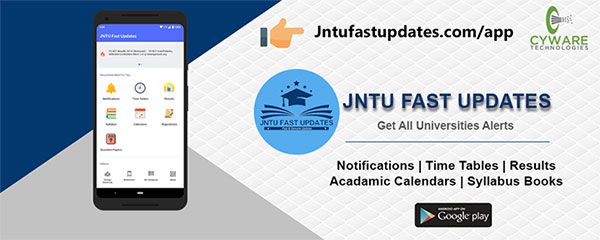JNTUK R19 3-1 Compiler Design Material/Notes PDF Download
Students those who are studying JNTUK R19 CSE Branch, Can Download Unit wise R19 3-1 Compiler Design Material/Notes PDFs below.

JNTUK R19 3-1 Compiler Design Material/Notes PDF Download
OBJECTIVES:
- To study the various phases in the design of a compiler
- To understand the design of top-down and bottom-up parsers
- To understand syntax directed translation schemes
- To introduce LEX and YACC tools
- To learn to develop algorithms to generate code for a target machine
Course Outcomes: At the end of the course, the students will be able to:
- Design, develop, and implement a compiler for any language
- Use LEX and YACC tools for developing a scanner and a parser
- Design and implement LL and LR parsers
- Design algorithms to perform code optimization in order to improve the performance of a program in terms of space and time complexity
- Apply algorithms to generate machine code
UNIT-1
Language Processors, the structure of a compiler, the science of building a compiler, programming language basics.
Lexical Analysis: The Role of the Lexical Analyzer, Input Buffering, Recognition of Tokens, The Lexical-Analyzer Generator Lex, Finite Automata, From Regular Expressions to Automata, Design of a Lexical-Analyzer Generator, Optimization of DFA-Based Pattern Matchers.
Download UNIT-1 Material PDF | Reference-2
UNIT-2
Syntax Analysis: Introduction, Context-Free Grammars, Writing a Grammar, Top-Down Parsing, Recursive and Non recursive top down parsers, Bottom-Up Parsing, Introduction to LR Parsing: Simple LR, More Powerful LR Parsers, Using Ambiguous Grammars, Parser Generators.
Download UNIT-2 Material PDF | Reference-2
UNIT-3
Syntax-Directed Definitions, Evaluation Orders for SDD’s, Applications of Syntax-Directed Translation, Syntax-Directed Translation Schemes, and Implementing L-Attributed SDD’s.
Download UNIT-3 PART-A Material PDF
Intermediate-Code Generation: Variants of Syntax Trees, Three-Address Code, Types and Declarations, Type Checking, Control Flow, Back patching, Switch-Statements, Intermediate Code for Procedures.
Download UNIT-3 PART-B Material PDF | Reference-2
UNIT-4
Run-Time Environments: Storage organization, Stack Allocation of Space, Access to Nonlocal Data on the Stack, Heap Management, Introduction to Garbage Collection, Introduction to TraceBased Collection.
Machine-Independent Optimizations: The Principal Sources of Optimization, Introduction to Data-Flow Analysis, Foundations of Data-Flow Analysis, Constant Propagation, PartialRedundancy Elimination, Loops in Flow Graphs.
Download UNIT-4 Material PDF | Reference-2
UNIT-5
Code Generation: Issues in the Design of a Code Generator, The Target Language, Addresses in the Target Code, Basic Blocks and Flow Graphs, Optimization of Basic Blocks, A Simple Code Generator.
Machine-dependent Optimizations: Peephole Optimization, Register Allocation and Assignment, Dynamic Programming Code-Generation.
Download UNIT-5 Material PDF | Reference-2
TEXT BOOKS:
- Compilers: Principles, Techniques and Tools, Second Edition, Alfred V. Aho, Monica S. Lam, Ravi Sethi, Jeffry D. Ullman, Pearson.
- Compiler Construction-Principles and Practice, Kenneth C Louden, Cengage Learning.
REFERENCE BOOKS:
- Modern compiler implementation in C, Andrew W Appel, Revised edition, Cambridge University Press.
- The Theory and Practice of Compiler writing, J. P. Tremblay and P. G. Sorenson, TMH
- Writing compilers and interpreters, R. Mak, 3rd edition, Wiley student edition.
e-Resources:

320-x100(1).gif)

we need unit 3 part A sir
Compiler design unit 3 part A is not opening
Unit 3 part-A link is not opening